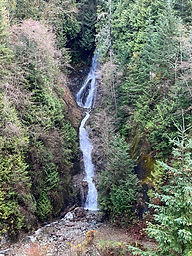A Passion For Where We Live
- kc dyer
- Oct 2, 2023
- 3 min read
Ruth Simons and Átl’ka7tsem/ Howe Sound

Átl’ka7tsem is one of the words used by the Squamish people to describe the region currently known in English as Howe Sound. This region is the 19th UNESCO-designated biosphere region in Canada. The Watershed recently asked Ruth Simons, a life-long resident of the area, and one of the driving forces behind the designation, just what this means for those who live here.
Simons is president and interim volunteer executive director of the Howe Sound Biosphere Region Initiative Society (HSBRIS). The society currently has 10 board members, including a Squamish Nation co-chair, and three staff. Simons has been involved in Howe Sound-related issues since 2011, and has been leading this initiative since 2017. Her work over the years made it clear that with so many overlapping jurisdiction, there was a need for a comprehensive plan focused on the Howe Sound region. She says she was drawn to the proactive and collaborative approach of the UNESCO Biosphere Reserve framework, and felt it was a good fit. "I have lived in this region all my life, but this work is endlessly fascinating, particularly during this time of reconciliation with First Nations." Residents of Lions Bay can be proud to live here, says Simons. "UNESCO Biosphere Regions are areas of unique global ecological significance, that actively make an ongoing commitment to sustainability The designation is designed to bring people together under a common goal and purpose, inspiring community members, businesses, and visitors to live and work in harmony with nature."
It's no secret that Howe Sound was subject to decades of industrial pollution from mining, logging and pulp and paper industries. But today, "the over 2,000 square kilometres of this fjord and watershed hold a diverse ecology, along with the internationally significant glass sponge reefs," explains Simon. She adds that the designation means that with a continued commitment by all authorities toward the objectives of a UNESCO Biosphere Region, "Howe Sound will continue to be a special place for generations to come."
Biosphere regions stand as models for sustainable development. Simons notes that there are many examples of this sustainability in action. "The town of Gibsons was the first in Canada to implement a Municipal Natural Asset Inventory and the District of Squamish has launched a Circular Economy roadmap."
The Howe Sound Biosphere Region Initiative Society (HSBRIS) is the non-profit society responsible for maintaining the UNESCO designation. Simons notes that while the organization does not have regulatory authority, they do have influence, and that their mission is to strengthen collaboration toward a sustainable future. To that end, the organization is convening participants from various sectors in the region to draft a management plan. Called the Nchu’ú7mut/Unity Plan, "this plan will be a reference document with a set of goals and priorities we can all get behind," says Simons. She adds that HSBRIS is convening participants from a number of sectors in the region to a Biosphere Roundtable.
Simons says that residents of Howe Sound are celebrating a healthier marine environment with the return of marine life, and the designation means increased awareness of the issues impacting local waters, including ocean pollution and the protection of fish populations and glass sponge reefs. She notes that the Vancouver Aquarium has conducted research in Howe Sound for more than 40 years. "Howe Sound is a living laboratory, and the designation increases opportunities for collaboration, research and monitoring. Today we work closely with the Howe Sound Marine Stewardship Initiative which produced a wonderful interactive map." Nevertheless, Simons is quick to note that this region continues to face pressures from increasing population, climate change, extreme weather events and biodiversity loss.
"These pressures mean we must care more about how we look after our communities. Individuals play a huge role in their everyday actions and choices. Becoming more informed on how to make a positive impact is a very good first step."
Simons recently received an honorary doctorate from Capilano University in recognition for her work bringing this UNESCO designation to Howe Sound. Since 2019, HSBRIS has worked closely with the university to integrate learning with their community and to bring students into the "outdoor classroom." Simons says she is excited about the new Cap U campus in Squamish and the opportunity to increase their collaboration. She will giving a short presentation on the future of the biosphere region on October 4 at the West Vancouver Memorial Library at 6 p.m.
"It's important for people to know that we wouldn't have achieved the designation without the contributions of so many volunteers and the work of many people from Lions Bay and around the region who were passionate about saving Howe Sound," says Simons. She adds that the HSBRIS is currently a not-for-profit organization, but they are seeking charitable status and sustainable long-term funding. To find out more, go to the organization's website, or look for #howesoundbri on social media.



it is wonderful that all the work you put into achieving your goal of getting Howe Sound recognized as a UNESCO Biosphere has paid off.. Congratulations.
Ruth has always been a passionate advocate for wildlife and our environment, and I thank her for her dedication.
Thank you Ruth for your commitment to our region and congratulation on your achievements.